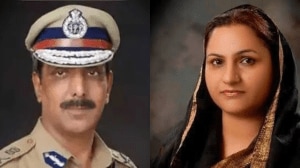Muffled voices at people’s court
MUMBAI, APRIL 13: As the city rushed on with its big businesses and fashion statements on Tuesday, Azad Maidan reverberated with the sound...

MUMBAI, APRIL 13: As the city rushed on with its big businesses and fashion statements on Tuesday, Azad Maidan reverberated with the sounds of forgotten voices telling tales that Mumbai usually muffles out. Some 2000 tribals, rural and urban poor, dalits, women, those displaced and those protecting an ecology which affects their livelihoods discussed how globalisation, privatisation and extensive industrialisation have re-shaped their lives. The occassion was a lok soonvai which had been organised by the National Alliance of People’s Movements (NAPM).
“The primary object behind the hearing was to unite the 45 smaller organisations and movements which gathered to speak about the issues that have been neglected and even marginalised by the accepted model of development,” explains Lata Pratibha Madhukar, National Convenor of the NAPM. Hearings were held under five heads – land, forest and water, displacement and the urban poor, rural poor and agriculture, social issues and rural and urban labour. “We chose to concentrate on these areas because they are most affected by globalisation,” reveals Sanjay M G, National Convenor of the NAPM.
Judges for the hearing were chosen because of their involvement with grassroot issues, informed Lata P M. After the hearing, these judges who included activist and senior Janata Dal leader Mrinal Gore, Ahilya Rangnekar and freedom fighter Khumse Appa, collated the information to present to representatives of state.
In one of the gaily red and mirrorwork tents, the issue of displacement raised its ugly head. “A women told us how EsselWorld has changed her life,” says social activist Pushpa Bhave who was one of the judges on this issue along with Justice Dawood. “She said that the rowdy youth who come there to picnic often harrass the young women who live in the area and the police don’t lift a finger to help,” she relates.
Other core problems were brought up by fishermen’s unions who are being displaced by ports and privitisation. “The Shiv Sena government came to power with the promise of standing by the sons of the soil,” states Bhave, “but I felt after listening to all of them that it is in the four years of the Sena’s rule that these sons have suffered greatly.”
A number of groups presented their case on social inequalities before barrister Teesta Setalwad and Barrister Palav. Women who play out their lives on footpaths stood up to talk on behalf of the Footpath Vasi Nagri Sanghatana about harrassment by police and their male counterparts who jostle with them for space on pavements. “We have no photo pass and no shelter – do we not deserve that dignity,” was the universal cry.
From Thane, a representative of the Saphayi Kamgar Union, spoke for 52 unions when he said that the men and women who swept and swabbed the filth of public toilets in the area had not even received their caste and domicile certificates. “We have no security at all – we aren’t even considered citizens,” came the heartfelt protest.
“When the Enron project was coming up at Dabhol we struggled against them ceaselessly,” reveals Vaishali Patel from Guhagar, “but nobody paid us much attention. The media needs to take up these cases with much more involvement – let people know what is happening.” Patel also revealed fears that Britannia’s plans to set up a factory in the area will displace them further.
Also represented were the central trade union Hind Mazdoor Sabha, Bahujan Sena, Rashning Kriti Samiti, Greenpeace, Narmada Bachao Andolan, Hawkers Association and otehrs. “Those who spoke had a dignity and grace about them as they spoke of their problems. Not once did they whimper,” says Bhave. “After I had listened to them I felt desperately sad as a citizen. I don’t know if the report we submitted to the government will make any difference but I do know that we really need to shake the middle class out of its stupor,” she says vehemently.
As most of these events end, it ended with a pledge to make a difference, to take a united stand – Tuesday’s was taken in a human chain with a setting sun to bear witness.



- 01
- 02
- 03
- 04
- 05




























